Major Sports
Organised sport played a huge part in the lives of all 1950s Wellingtonians, whether they liked it or not. Michael Llewellyn-Smith (Orange 1952-57) wrote ‘Sport was a large part of our worlds.’ Charles Ward (Hopetoun 1951-55) remembered that ‘Games or physical activity of some sort were compulsory on most afternoons except Sundays,’ a recollection shared by Chris Heath (Beresford 1948-53): ‘Everybody had to play games most days of the week, with the exception of Sundays, and Wednesdays when there was Corps.’ Peter Rickards (Murray 1947-52) put it simply: ‘Afternoons were for sports.’
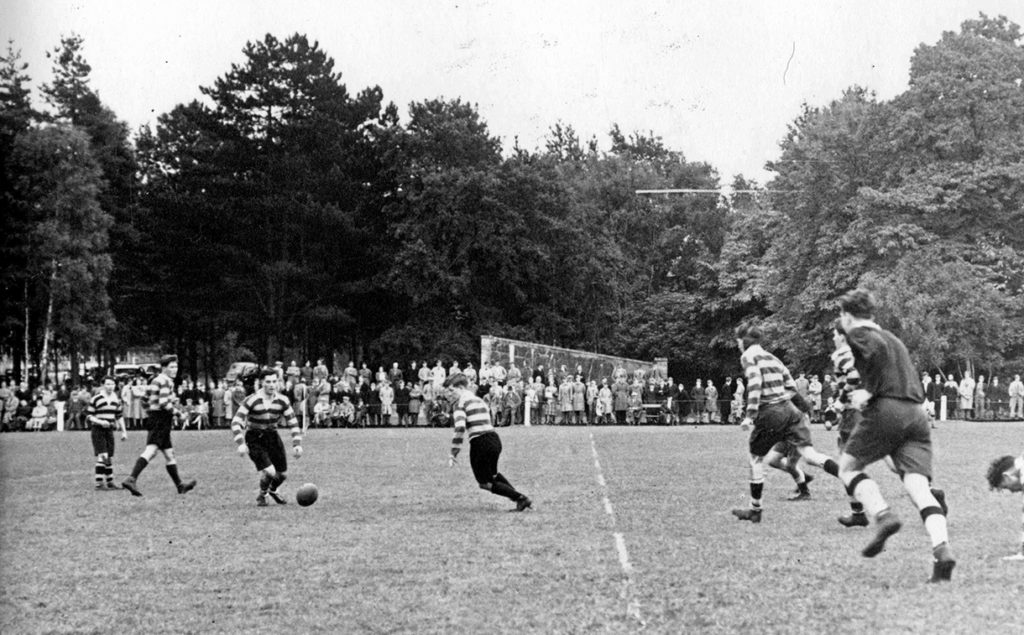
For many, this emphasis was a good thing:
‘I loved sport at Wellington.’ Murray Glover (Anglesey 1947-51)
‘Sport was the highlight of my days at Wellington.’
Graham Stephenson (Combermere 1953-57)
‘I loved the sports and played everything available!’ William Young (Anglesey 1954-58)
‘A major benefit of being at College was the large number of major and minor sports one could undertake.’ Jerry Yeoman (Anglesey 1955-59)
But of course, others felt differently:
‘I disliked all forms of sport and did all in my power to avoid taking part. Cricket was top of my antipathies; it took up far too much of our spare time, and to me was a total bore.’ Hugo White (Hardinge 1944-48)
‘We all had to participate in everything, which was a trial for a rather unathletic small boy.’ John Flinn (Combermere 1944-49)
‘I deeply loathed all games – all those white lines and rules and being confined to a tiny field. I wanted to take off into the countryside.’ David Ward (Hopetoun 1954-58)
‘Wellington can fairly claim to have put me off organised team sport for the remainder of my life.’
Richard May-Hill (Hopetoun 1957-61)
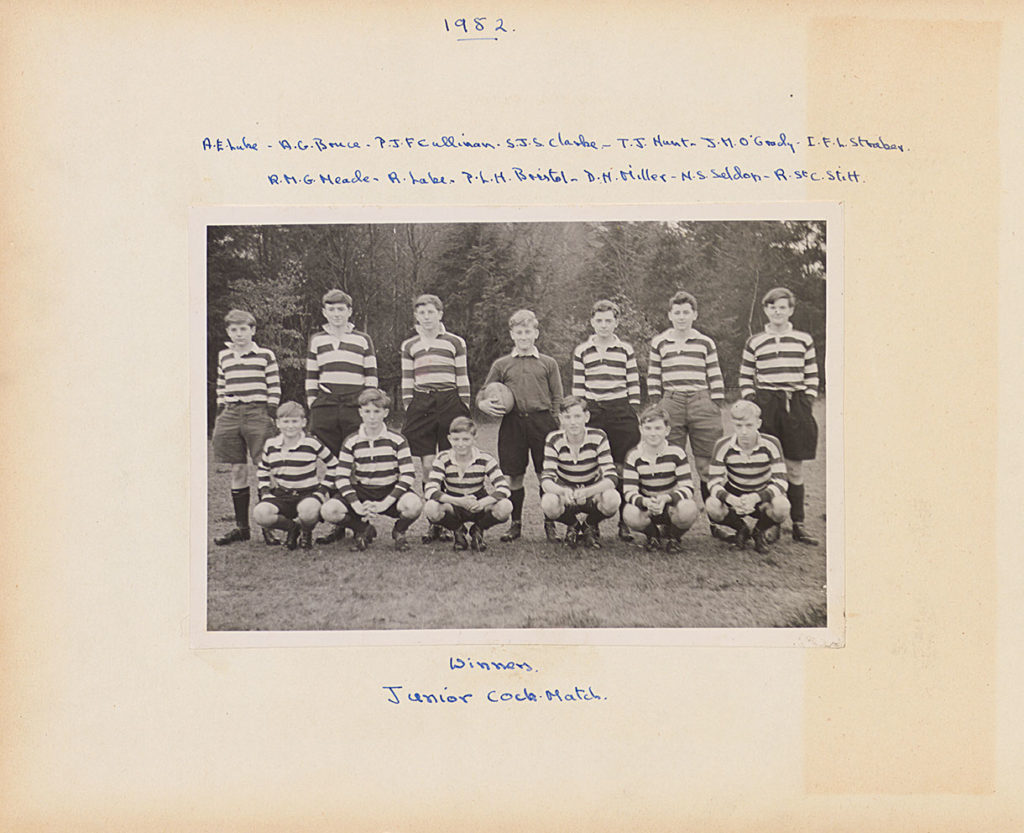
Many commented on the social status and prestige which came with being good at games:
‘If one played games at a top level, undoubtedly you got noticed and had a better time, and as a result I much enjoyed the last two years at Wellington, the first three having been quite tough.’ John Alexander (Talbot 1954-58)
‘It didn’t take me long to realise that life in the Benson would be dominated by sports of all sorts, and that the best way to establish one’s identity would be by accepting this and showing appropriate enthusiasm and, if possible, some ability… Luckily I enjoyed most sports, which seemed more important than academic studies.’ Christopher Capron (Benson 1949-54)
‘Sport was my saviour! With my morale being at a low ebb at the very bottom of the school, I did well in the Yearlings cricket team in the summer of 1949. Subsequently, I worked my way up the cricket, rugger and hockey age group teams to end as a triple Colour. My academic inadequacy was ignored as I basked in the limelight!’
Henry Beverley (Anglesey 1949-53)
This special status was summarised by Peter Cullinan (Benson 1948-52), who recalled ‘swaggering proudly to Grubbies wearing my First XV cap, which enabled me to jump the queue.’ John Watson (Benson 1946-51) reflected on the other side of the divide: ‘In my era, sport was perhaps regarded with too much importance. I felt genuinely sorry for those boys who were not athletic by nature and were sometimes given a very rough time.’
Charles Enderby (Picton 1953-57) considered that ‘sport was well run for all abilities’, but Nick Harding (Combermere 1951-1955) felt ‘there was no serious coaching unless you were good.’ Martin Kinna (Murray 1953-58) agreed: ‘In retrospect, I feel there might have been more supervision, and attempts to show hopeless cases like me how to play and use the stick or bat or whatever.’
And a few non-sporty boys still found a role through which they could be involved:
‘I was not sporty, rather a “swot,” which brought me trouble, but I remember kindness from David Scholey. I became a touch-judge for rugby, and so enjoyed it more. I became scorer for the school’s First XI cricket team, which I enjoyed, and I think I also went with them on away matches.’ Anonymous
‘I didn’t enjoy cricket but liked scoring (out of the rain or sun), and scoring let one travel to matches too.’
Robin Lake (Benson 1952-57)
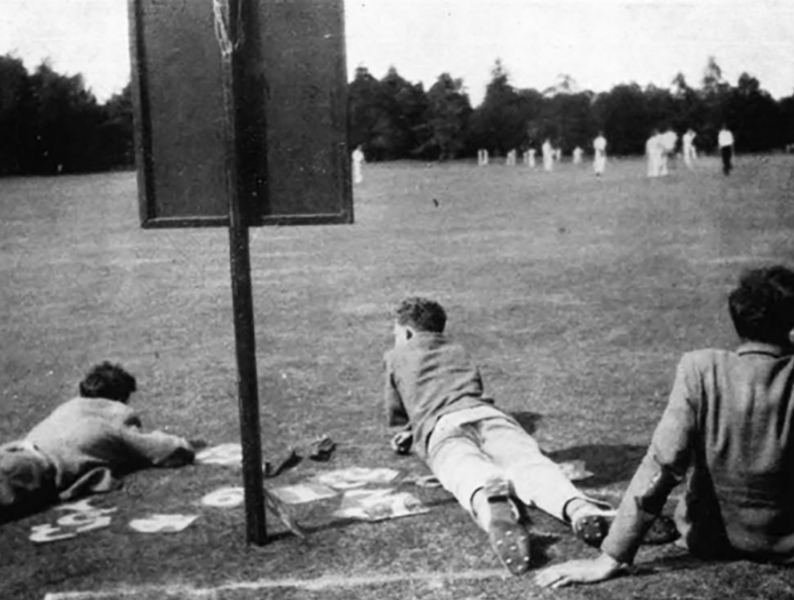
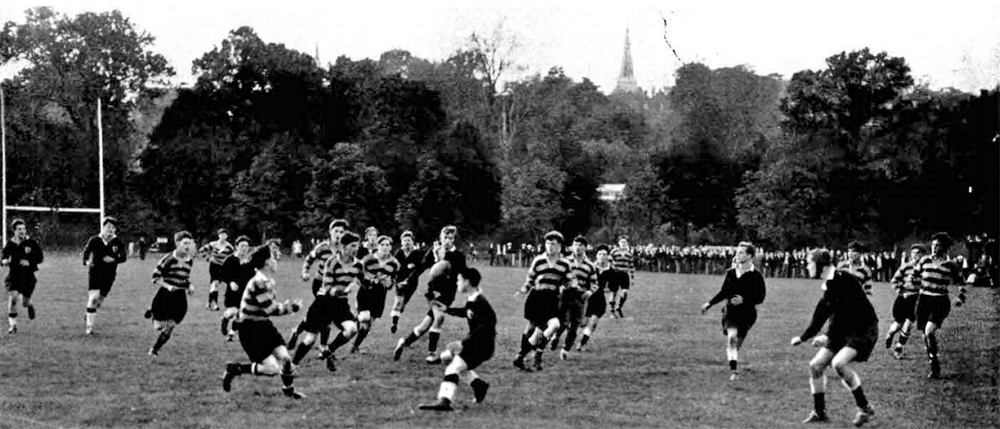
Life as a supporter
House and Dormitory sport was taken very seriously in the 1950s. One was expected to turn out and support one’s team, the cheers often being led by the Dormitory Tutor:
‘Hardinge was rather good at sports, guided by “Gaffer” Reese who stood on the touch line and shouted, “Sodom and Gomorrah boy, tackle him!” We won many cups.’ John Hoblyn (Hardinge 1945-50)
‘The one time I remember getting really excited as a spectator was a match in which Hardinge came from behind to win the game at the last moment.’ Graeme Shelford (Hardinge 1954-57)
‘Dormitory rugby was more demanding, since Hugh Marston insisted that the Hardinge should play mercilessly and win everything!’ Thomas Courtenay-Clack (Hardinge 1954-59)
“Philip Letts took over the Anglesey from “Hus-Gus” about halfway through my time at College. A terrific enthusiast, his memorable rallying cry when coaching rugby was “go split-arse for the corner flag!”’ Henry Beverley (Anglesey 1949-53)
All students were also expected to support the school First teams at home matches, and in fact, failing to do so was a beatable offence. Again, some enjoyed this more than others.
Peter Marshall (Stanley 1947-51) wrote ‘I quite liked watching the First XI cricket on Turf, but would only stand on the touchline at Bigside under compulsion.’ Peter Rickards (Murray 1947-52) told us how he and his contemporaries made these hours more entertaining:
‘As juniors we were required to watch the College cricket matches on Saturdays. Those of us not enthralled by the game would construct miniature obstacle courses in the soil around the edge of the field for the much more exciting snail racing competitions.
‘While watching inter-school rugby matches in winter, a popular practice was to warm up a half-pint bottle of milk to be pocketed as a warm drink. To avoid detection, the drink delivery system was composed of a length of rubber insulation stripped from electrical wiring. The tube could be threaded from the bottle through one’s clothing and retained with a small bulldog clip to the collar of your jacket. Body heat kept the drink warm throughout the match. By this means a sip could be taken without anyone observing this crime! If in the heat of the moment the clip failed, warm milk would be siphoned through one’s clothes with embarrassing consequences.’ Peter Rickards (Murray 1947-52)
There was a definite hierarchy of sports at Wellington, the ‘major’ sports being compulsory, as summed up by Nigel Gripper (Hopetoun 1945-49): ‘We were all obliged to play rugby in the autumn, field hockey in the spring and cricket in the summer.’ Alan Munro (Talbot 1948-53) likewise recalled ‘rugger, hockey, and athletics standards in summer. There was little choice beyond these.’ Richard Craven (Hill 1950-54) enlarged: ‘Rugby, cricket, hockey and athletics were major College sports providing teams through all age groups from Junior Colts, Colts and then College teams competing against other schools. As I recall, swimming, tennis, racquets, squash, fives and fencing were minor sports.’
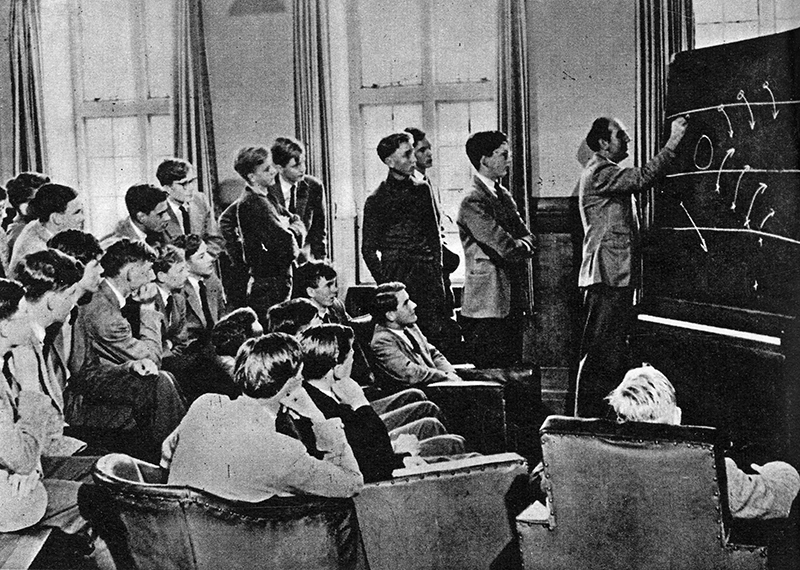
Rugby
Rugby, or rugger, was perhaps the most important sport at Wellington in the 1950s, and everyone participated at some level. Colin Mackinnon (Hardinge 1951-56) got off to a good start: ‘My first term, starting in September was a “rugger term” and the fact that I had already played the game, whereas most of the other new boys had not, stood me in good stead and I played in the College Yearlings 1st XV as fly half.’
Richard Harries (Hill 1949-54) sadly could not fulfil his ambitions: ‘Any early promise I had as a rugby player at prep school rapidly disappeared when I grew lanky as a teenager, not heavy enough for the scrum and not quick enough to be the good three-quarter I aspired to be.’ Others also felt that their size or build disadvantaged them:
‘I was small for my age and the major team games like rugby were not to my liking. I was usually placed as a hooker, with the result that I was always in fear of breaking my back in the middle of the scrum!’
Michael Trevor-Barnston (Anglesey 1957-60)
‘I hated rugby (not heavy enough for the scrum, nor fast enough for the wings), but had to play it. When I left, I thought, “Thank goodness that is the last rugby game I ever will have to play,” only to go straight into the army for National Service, to be told “We see you were at Wellington so we have put you down for the rugby game.” They dropped me after three games.’ Hugh Trevor (Hopetoun 1943-48)
Some enjoyed the game despite the difficulties:
‘Rugby was my favourite sport, but it was usually too cold to enjoy it. I remember how much my frozen ears hurt in the scrum.’ Graeme Shelford (Hardinge 1954-57)
‘Rugger I hated until, (how, I never quite understood), I found myself selected for the First XV team, at which point I thought I had better put myself wholeheartedly into it, and I began to enjoy it. I also developed a talent for place-kicking, the stiff-soled boots of the time allowing for the straight-on direction of the kick, not the sideways approach now dictated by the softer boots.’ Peter Gardner (Hardinge 1946-51)
Murray Glover (Anglesey 1947-51) found rugby ‘a nasty, dangerous game’ compared to both hockey and cricket, and for many, real or imagined injuries were never far away:
‘I was a hooker and my back was compressed in large parts as I entered the First XV too soon. I scored from hooker for the 1st XV against Radley, but was replaced by Apthorp, who was even smaller, next match. Yes, I thought I had been cheated, but it saved my back.’ John de Grey (Blücher 1938-43)
‘Although I was not a thug or big, I was Thirds’ hooker. Often the Firsts’ hooker was crocked, so I played five times for Firsts and three times for Thirds, and I was the Dormitory hooker from the age of fifteen. My nose was broken three times and the last time knocked it straight!’
Bertram Rope (Picton 1949-54)
‘Rugger XV… being kicked in the head at Harrow and badly concussed. Ditto at Marlborough.’ Michael Campbell (Hill 1954-59)
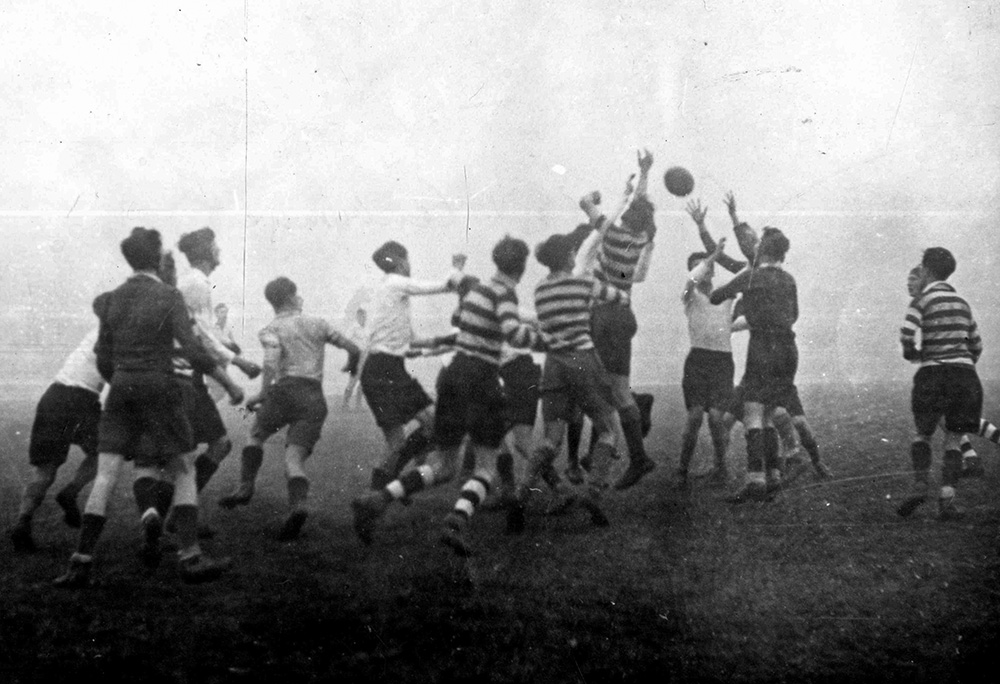
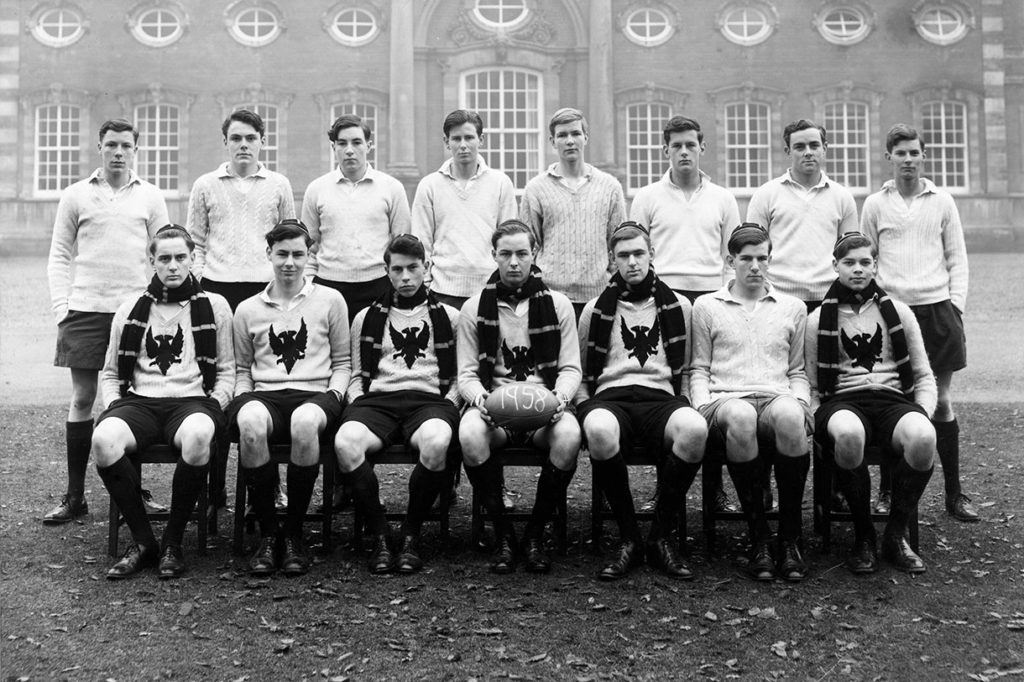
Michael Mathew (Murray 1956-60) appreciated the way inter-Dormitory rugby competitions afforded ‘an opportunity to play against members of the school First XV,’ but Richard May-Hill (Hopetoun 1957-61) found this less attractive: ‘Schools were still allowed to field Dormitory teams comprised of boys of all ages. This resulted in small 13-year-old boys being in a scrum with heavyweight 18-year-old seniors. I can still vividly recall during my first term, as a short lightweight being played as hooker, thinking that my spine was going to snap every time there was a scrum.’
George Nicholson (Hardinge 1949-54) never came to terms with the sport: ‘One was expected to enthuse about rugger as a player or spectator. I loathed the game. I was always put in the second row in the scrum.’
The most unusual recollection about rugby comes from Bob Terry (Hopetoun 1954-57):
‘One memory which stands out for me was, as a new boy, standing on the touchline at a practice match between the rugby First and Second XVs in the mid-1950s. College had, as part of an exchange, accepted a student from the USA, an American college footballer. He was playing for the Second XV in a rugby match for the first time in his life. His knowledge of rugby was clearly limited, with particular reference to the offside rules. However, his ball handling and throwing skills were absolutely amazing and enthralled us young spectators, including one-handed throws covering the length and breadth of the field of play. It confused the pattern of the game but was wonderful to watch. I have never forgotten that event.’
Hockey
For a long time something of a ‘poor relation’ at Wellington, by the 1950s hockey was the established sport for the Lent term. Many respondents enjoyed it:
‘Hockey was my favourite game. I was in the First XI for three years and Captain in 1958. In those pre-artificial pitch days, matches were often cancelled due to bad weather.’ Anthony Collett (Combermere 1953-58)
‘I was on the Hockey XI for two years (Left Back) which enabled me to keep fit and enjoy the outings for away matches and the Public Schools Tournament in Oxford.’ Robin Lake (Benson 1952-57)
‘I was Centre Forward for the Orange hockey team, who won every match and took the hockey trophy for that year – an Orange first.’ John Ravenhill (Orange 1953-56)
‘In the case of hockey, I was fortunate to be part of a very strong Picton team which won the inter-dormitory knock-out competition, and I was awarded my College First XI colours, playing Right Half. I recollect playing against the OW team, when I found myself marking Simon Clarke, who would shortly become scrum half for the England Rugby team.’ Tony Glyn-Jones (Picton 1954-59)
Although some could find no talent for it:
‘Hockey was an anathema, and I found eye-to-ball contact was not my strong point, as the ball remained still on the ground while my swipes at it merely sent divots into the air.’ Martin Kinna (Murray 1953-58)
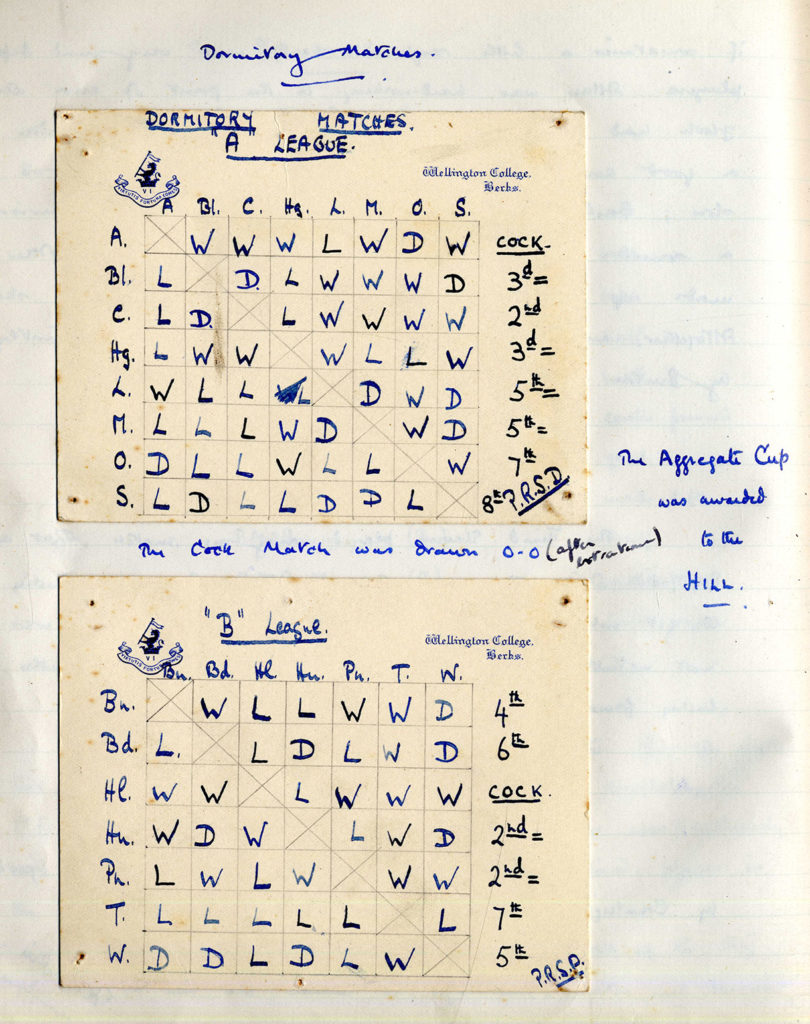
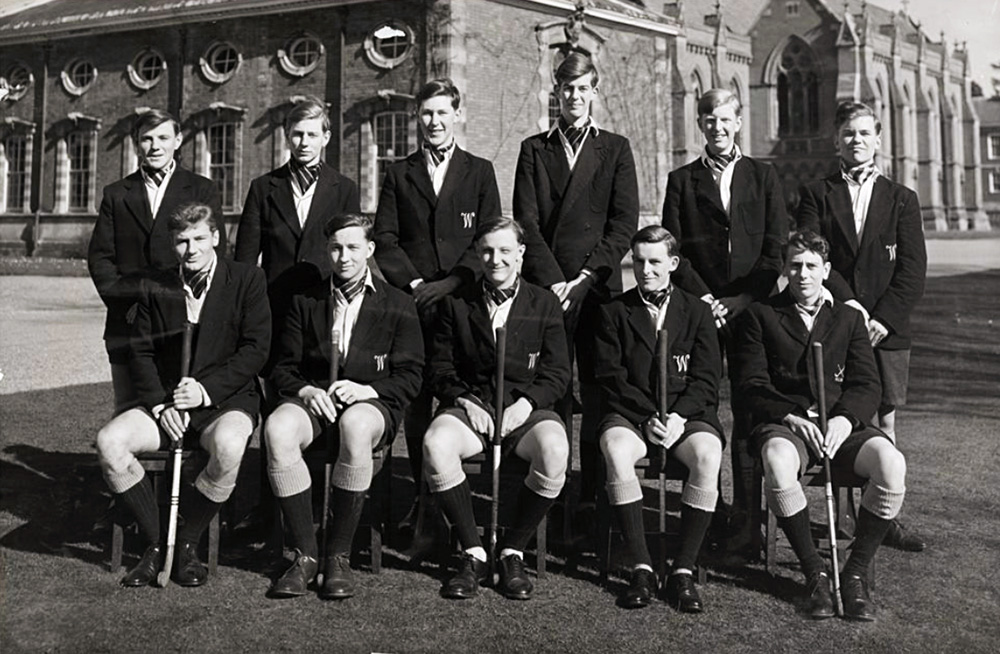
And as with rugby, injuries were always a possibility:
‘At hockey, being a left-hand batsman, I volunteered to keep goal… A cold and lonely place in which one day you are going to get hurt.’
Douglas Miller (Benson 1951-56)
‘I never had any pretensions to being good at hockey – indeed, all I can remember is playing a game on a pitch in front of “Grubbies” and being hit, very hard, on the wrist by a rising ball, and saying VERY loudly a single explosive and quite involuntary, “F**k!” This was distinctly “daring” if that is quite the word – later, having become intimately acquainted with sailors, I heard it often (to say the least), but at this time the F-word was NOT used in polite society.’ Alastair Wilson (Talbot 1948-1950)
‘In my last term, when I was Captain of the 1st XI, I was “taken out” while striking a short corner in the inter-dormitory semi-final. I ended up in hospital having fluid drained off a severely damaged knee, with the consequence that I missed the last two school matches. I went with the team to the Oxford Hockey Festival that Easter, but of course could not play. The Duke of Edinburgh was visiting, and I spent some time on the touchline talking with him about deck hockey, as he had played it in the Navy.’ Colin Mackinnon (Hardinge, 1951-56)
And some got into trouble completely unrelated to the game itself:
‘Once, when I captained the Colts XI, we played away at Marlborough. We had to change in a boys’ dormitory, where some of my team thought that the boys’ pyjamas should be removed from under their pillows and shoved down inside a nearby piano. Marlborough was not amused, and I was suitably admonished back at College!’ Anthony Collett (Combermere 1953-58)
Cricket
Then, as now, cricket provoked strong emotions both for and against it, but only a handful of our respondents were in the latter category. One anonymous respondent claimed, ‘I think I was the only Wellingtonian never to have played a single game of cricket in my whole time at Wellington. I made it very clear that I hated it after my prep school experiences.’
Martin Kinna (Murray 1953-58), not a great fan of any sports, recalled:
‘I loathed cricket and did everything to get out of playing it. I had to turn out twice; the first time, rain stopped play before I had to do anything, and the second time I was fielding on the boundary in a daze when my name was called out and, to my horror, I saw a ball speeding along the ground towards me. Some kind of race memory told me these balls were hard, so instead of trying to stop it with my hands I trod on it, sprained my ankle and had to be carried off the field, never to have to play cricket again!’
And Thomas Courtenay-Clack (Hardinge 1954-59) confessed to poor sportsmanship:
‘In cricket, I developed a trick which portended my later career as a sound-effects man. Fielding in the slips, standing next to the wicketkeeper, I would loudly click my tongue at the moment the batsman hit the ball. If he missed, it would sound like the ball had nicked the bat, and when the wicketkeeper caught the ball I would call out, “Howzat?” Nine times out of ten it worked like a charm and the puzzled batsman would be called “out.”’
Colin Mackinnon (Hardinge 1951-56), meanwhile, was keen but suffered a setback:
‘In my first Summer term I had opted to play cricket, having been a wicketkeeper at my prep school. Sadly, it so happened that I was late two weeks running to the Yearlings’ nets practice, and Doug Young, the master in charge, told me he never wanted to see me again, so that finished what might have been an outstanding cricket career! In fact, I did later play for the Hardinge in dormitory matches, without great distinction, but I was eventually awarded my dormitory cricket colours – for fielding!’
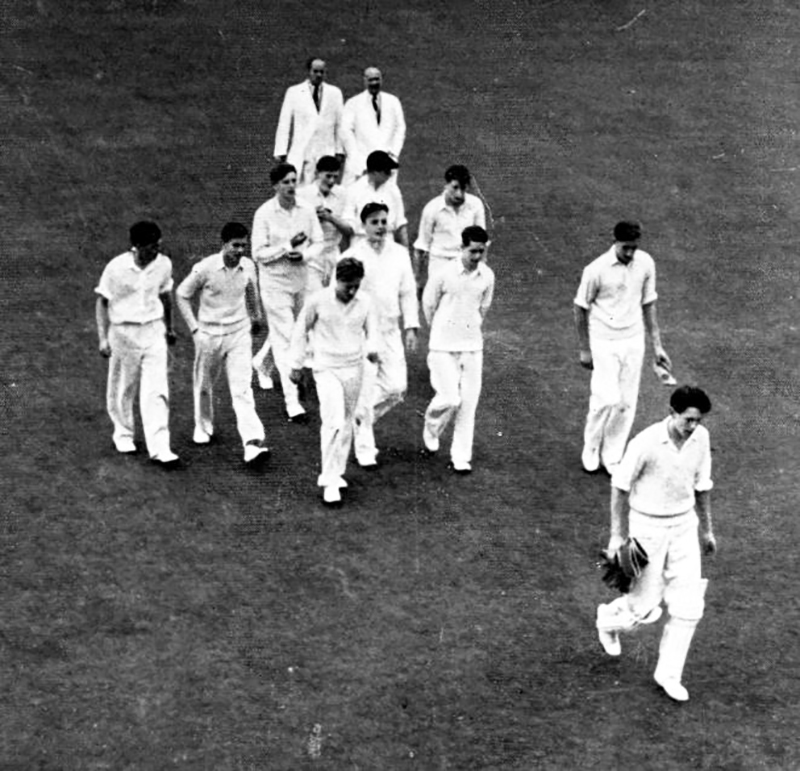
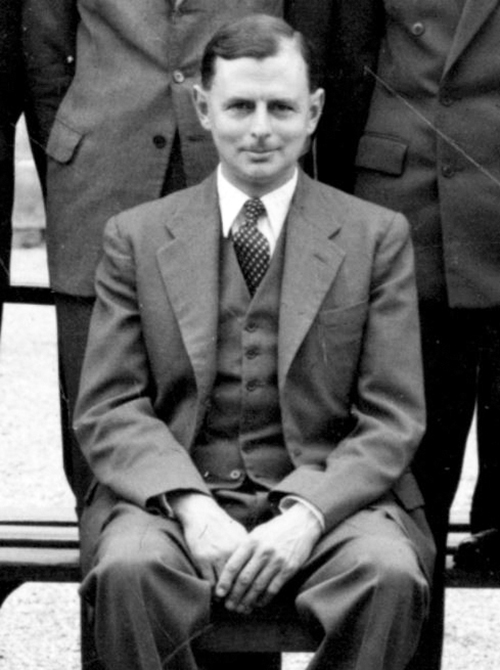
Others also remembered Douglas Young in this context:
‘Douglas Young was the master in charge of cricket, dark-haired, handsome, pipe-smoking. He had won a Blue for cricket at Oxford, bowling slow leg breaks. By this time, his bowling had lost its sting.’ Michael Llewellyn-Smith (Orange 1952-57)
‘Cricket was my strongest sport, and I thrived under the direction of Douglas Young. He had been captured with much of the 51st Highland Division at St Valery-en-Caux during the fighting retreat in June 1940. Unsurprisingly, after nearly five years as a POW, he was somewhat acerbic, but had our respect.’ Henry Beverley (Anglesey 1949-53)
‘One of my main memories is of being quietly corrected by Douglas Young after getting out for 90 against Oxford University Authentics. It wasn’t that I had got out, but I should have raised a bat to acknowledge the applause of the spectators when I returned to the pavilion, rather than being wrapped up in my own disappointment in missing a century – correct behaviour and good manners were important.’ Adrian Stephenson (Talbot 1957-61)
Other teachers passionate about the sport included Fergus Russell and James Wort:
‘Fergie Russell, a great cricket fan, once got quite excited when he discovered that I could bowl a googly. However, despite this new-found skill, I became a full-time athlete when I was old enough to choose which summer sports to pursue.’
Chris Heath (Beresford 1948-53)
‘The Combermere under Jack Wort was very competitive, and I remember one cock match in about 53-54. We were up against the favourites, but Jack reckoned there were ways of beating them. So our eleven team members were summoned after “swipes” the day before, and had a blackboard session on field placings and bowling techniques. With his lisp, he told us, “Now the other sing is to look your best. Go and bwush down your cricket bwoots and pwads and blanco them – going in to bat feeling good is worff a great deal to your morale and the opposition is bound to be impwessed.” I think we won – very much due to his coaching and advice.’ Colin Innes (Combermere 1949-54)
Perhaps this was the match remembered from the opposing viewpoint by Bertram Rope:
‘At cricket I was a hopeless bat but a fast bowler, and used to be put on with Gary Williams, another quick bowler, to keep the runs down. The only time it did not work was in the final cock match against Jack Wort’s Combermere. They won – that time! Jack Wort also taught the 3rd XV rugger team and I can’t remember ever losing. Another of his interests was the Occasionals cricket, for those not good enough for College teams – including me. We used to pile into his Ford Pilot and another usher’s car and play the local village teams.’ Bertram Rope (Picton 1949-54)
Indeed, the Occasionals were fondly remembered by many:
‘Cricket with the Occasionals was the highlight, playing against local villages.’ Anonymous
‘I was a fast bowler which I enjoyed perfecting. Sometimes, in the absence of a team match, we formed the Occasionals club to play in the villages, or, if your opposing team didn’t turn up, you were sent on a three-mile run.’ Peter Davison (Beresford 1948-52)
‘I enjoyed Cricket in the summer and played consistently for my dormitory and also for a team called the Occasionals, which was always very civilised.’ Nigel Hamley (Hill 1952-55)
‘Most enjoyable were Saturday fixtures played against local village teams, of all ages, and termed “Occasionals.”’
Richard May-Hill (Hopetoun 1957-61)
‘I kept wicket for the 2nd XI, but I particularly enjoyed playing for the Occasionals because the team was made up of staff members well as boys. Mr James Wort was a slow left-arm spinner, and I remember late one afternoon, with the batsmen having to face a dipping sun, I stumped five of them off his bowling. Thereafter, he referred to me as his favourite pupil!’ Robin Ballard (Orange 1955-59)
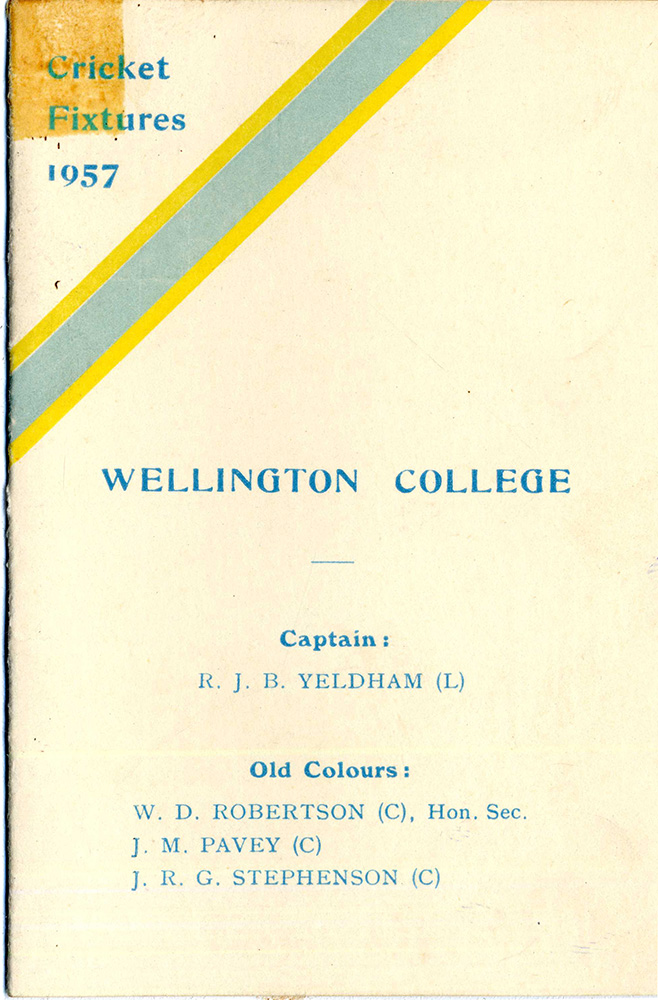
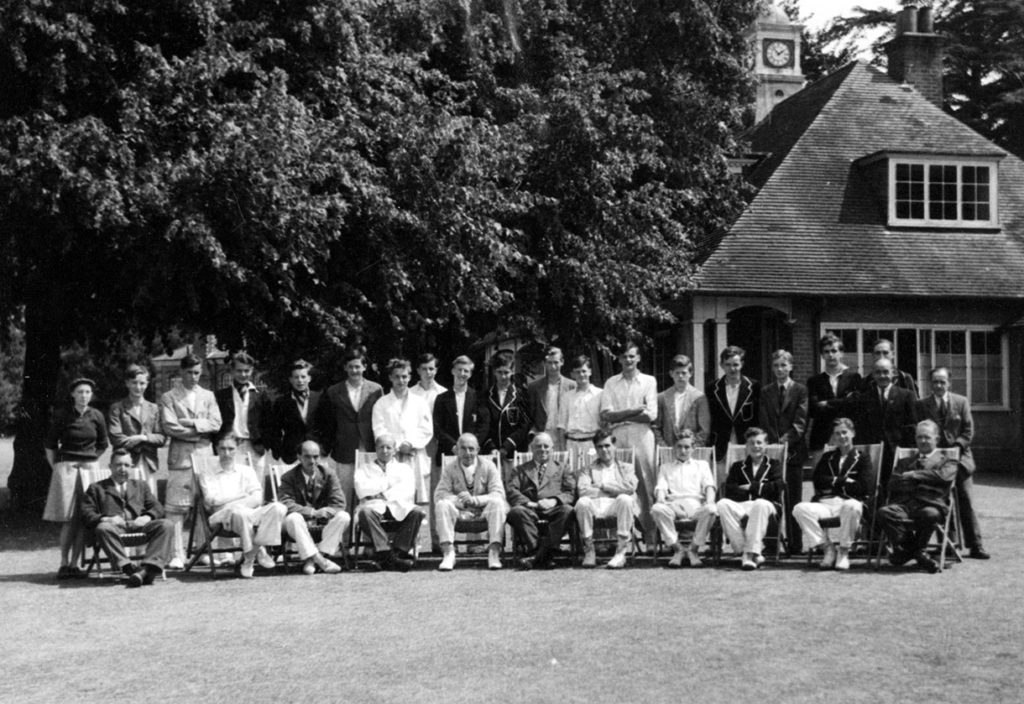
A lot of our respondents had high praise for the College’s professional cricket coach, Fred Berry:
‘I owe my cricketing skills to the wonderful cricket professional, Fred Berry. He was charming, inspirational and a Yorkshireman. Perhaps these all go together!’ John Alexander (Talbot 1954-58)
‘Fred Berry was far more than College’s cricket professional. He was, for many of us, a “father confessor” figure and recipient of personal confidences unsuitable for teachers.’
Christopher Capron (Benson 1949-54)
‘Cricket was my main love, inspired by the coaching of Fred Berry. I would happily spend hours in the nets and hope that he would pass by with some hints on technique and words of encouragement.’ Adrian Stephenson (Talbot 1957-61)
‘Fred Berry, one of nature’s true gentlemen, was hugely liked and admired by generations of Wellingtonians.’ Henry Beverley (Anglesey 1949-53)
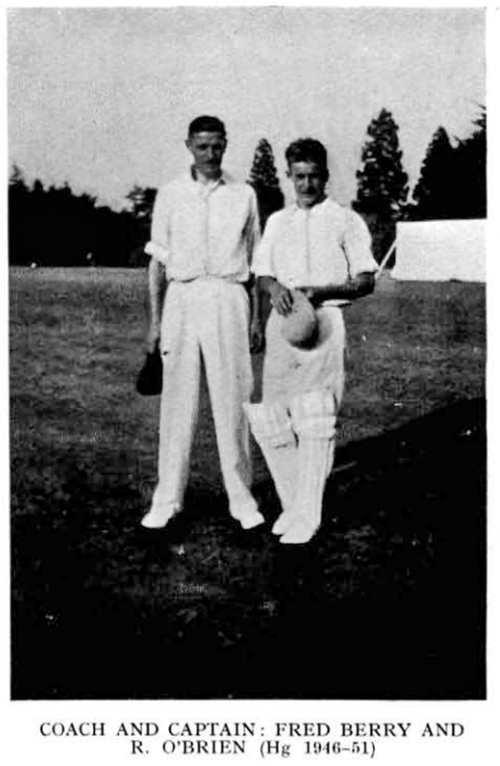
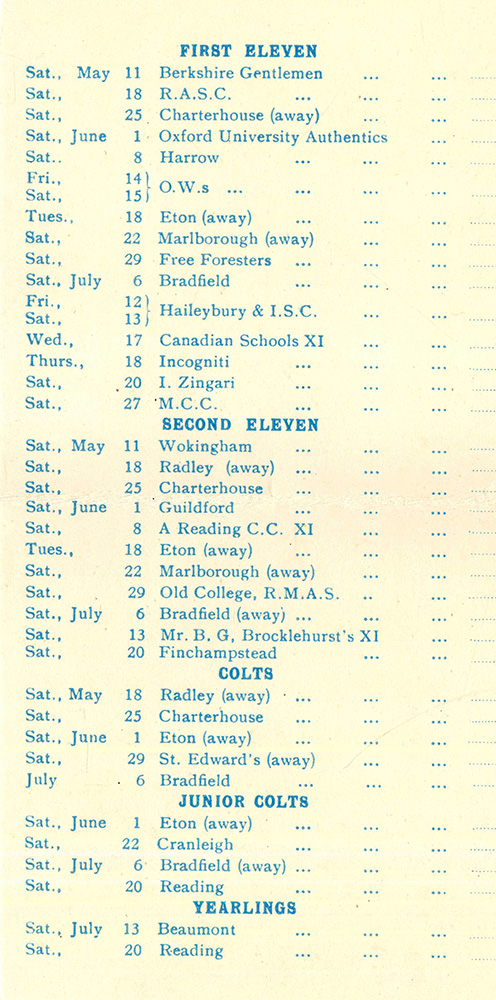
Thus inspired and coached by Fred and others, many Wellingtonians made cricketing memories which would last a lifetime:
‘I was in the First XI for two years and it was the highlight of my Wellington experience.’ Graham Stephenson (Combermere 1953-57)
‘My greatest love was always cricket, but I never reached the upper strata of the game. In Colts, I remember being hit for 24 in an over by David Mordaunt. I held a legendary catch in the slips when the Benson won the Junior Cock House match against the Combermere. I played on Turf only once, in the final days of my last summer term – for the Occasional, against I know not whom, but I carted Robert Gatehouse (OW) over mid-wicket. I gained my Benson colours for taking four for 45 in 35 overs against the Hardinge in a match we narrowly lost. It went on for three afternoons on the pitch closest to Bigside. We made about 140 and they were 7 for 2 overnight, both wickets to me. A weekend intervened over which Simon Clarke got drunk (I think that was the real illness, but I might be wrong). With him away on the Monday, the Hardinge foolishly dawdled; a boy called Tittle prodded away, but even with Simon’s return, we were pipped on the third day. Extraordinary to recall such detail after so many years!’ Douglas Miller (Benson 1951-56)
‘I had the luck to score a half-century for the Second XI against Radley, at Radley. This caught the attention of the powers that be, and I was promoted to the First XI, an unusually strong team that year, invicti, with Ian Addison captain, David Mordaunt, Gary Williams, and Simon Clarke trundling leg breaks. I lasted there only two or three games before rightly being relegated again. I was determined to make up for this next year, and succeeded in doing so, opening the batting with Simon, later scrum half for England. I suppose that, apart from music (and ‘work’?), cricket was the most important thing in my school life. The dry baked earth of Turf still invades my dreams. My most vivid memory is of bowling fast leg breaks in the nets to David Mordaunt. He will have forgotten this, but it was one occasion in my life when everything came right: speed, spin, length. A few weeks later he was playing for Sussex.’ Michael Llewellyn-Smith (Orange 1952-57)
‘I had a once-in-a-lifetime cricket moment in taking six wickets for one run in a House match. A few of my teammates then jokingly berated the fielder who had let the ball slip through his legs for the one run!’
Alan Saunders (Orange 1957-60)
Cross Country
Well-known as Wellington’s oldest sport, cross-country running was compulsory for all in the 1950s. Some were not fans:
‘Ploughing through brambles and muddy streams on the Pancake and the Kingsleys are my least pleasant memories of Wellington.’ Anonymous
‘The Littleside was tough, as I found to my cost: having fallen early when near the lead, I became a stepping-stone in a ditch. This led to a week in bed being looked after by Mrs Evans. I did a lot better in the next year’s Littleside.’ Anonymous
‘My least favourite pastime was cross-country running; it always struck me that, as there was no ball involved, or piece of timber to hit it with, it was all pretty pointless!’
Jeremy Watkins (Blücher 1951-55)
‘I was excused running because the doctor got it into his head that I was outgrowing my strength. Well spoken. I was happy to agree.’ Douglas Miller (Benson 1951-56)
‘I was made to do some cross-country runs such as the Bigside, Littleside and the Kingsleys, which were (in my mind) punishments sent from Heaven or Hell for some failing or other on my part. Quite diabolical, and I still reflect on them with a great deal of horror.’ Jerry Yeoman (Anglesey 1955-59)
‘We were all obliged to take part in mass cross-country runs, the Littleside, Bigside and Kingsley. My power/weight ratio rendered me totally unsuitable for these, and I hated them. The Kingsley required one to jump in and out of icy streams. My most frightening experience was on a dormitory run, when I was lagging two hundred yards behind the rest. To my consternation I saw a gang of Broadmoor inmates, wielding sickles to trim the grass edges of the lane, under the watch of a single guard. As I staggered past, they all raised their sickles and leered at me.’ Murray Glover (Anglesey 1947-51)
‘The spud field also featured as a major challenge on college cross-country runs. The course included a steep ascent of Edgbarrow Hill, the artificial creation housing the college reservoir, hence the severe gradient, then an equally steep descent, at the base of which was a cutting several feet deep, which had to be crossed at right angles before the runners climbed up the opposite bank and entered the spud field. This was crossed at an angle to the furrows, which were not conveniently spaced for the average stride. On cold days the ridges would be frozen solid and likely to encourage twisted ankles, whereas after wet weather it was a quagmire.’ Richard May-Hill (Hopetoun 1957-61)
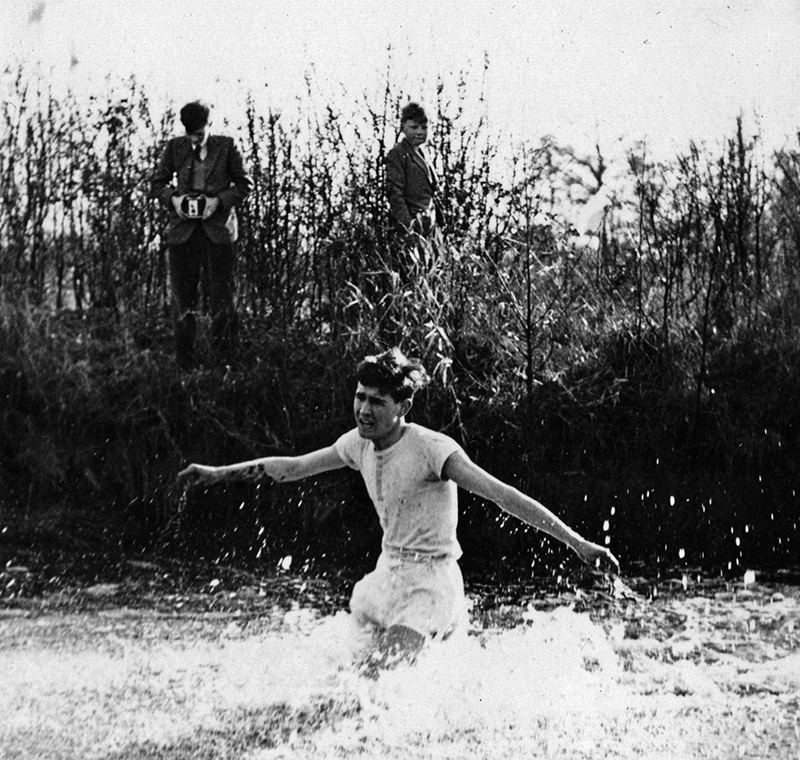
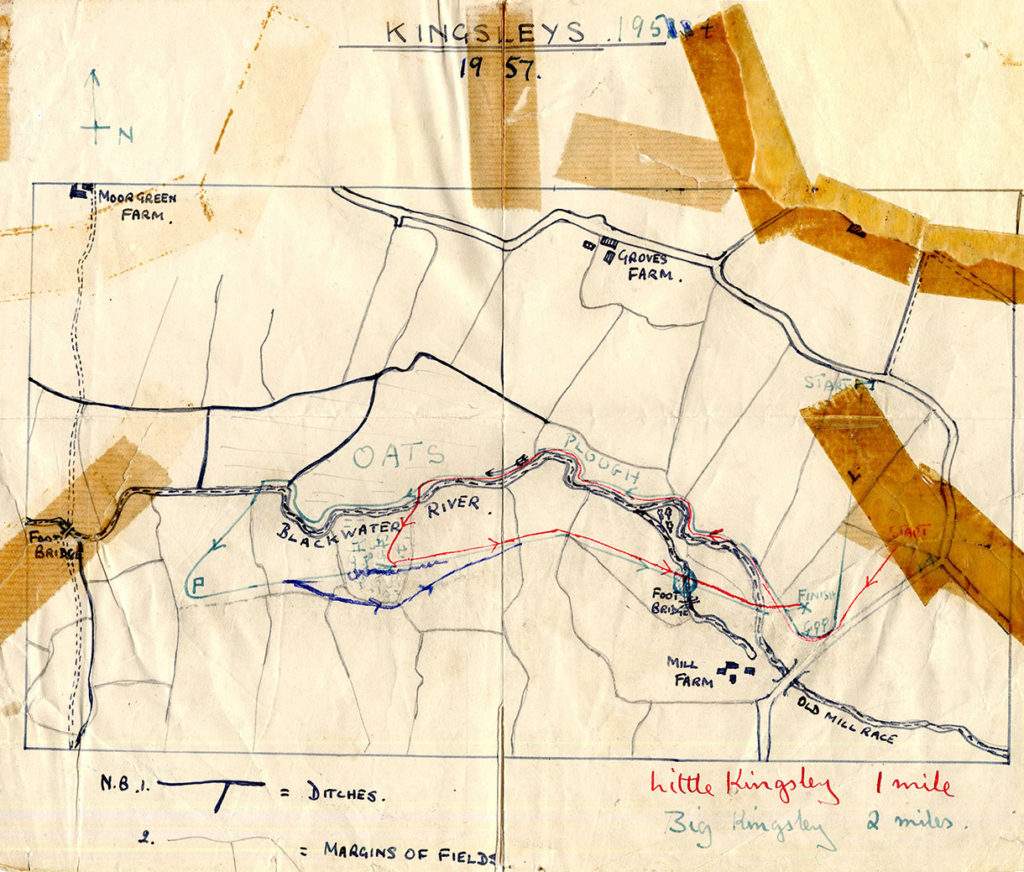
For one OW, the bad memories were not directly related to the running:
‘I was a runner, because it was a quick and easy “change”… I won the Littleside to expose the Blücher sports Prefect for putting me in to make up numbers, even though he knew I was too old (by a matter of weeks). After several hundred yards, there was a huge ditch. Everyone in front of me was clambering through it, but I prided myself on my long jumping and I jumped over the lot of them. I may have landed on some of their hands… Although I told my Tutor [that the Prefect had put me down for the race although too old], he concealed this and I appeared in the Wellingtonian as having cheated and been disqualified. I remember concluding at the time that all adults were dishonest and would effectively lie to preserve the establishment’s performance.’ John de Grey (Blücher 1938-43)
But others were more positive:
‘I was introduced to cross-country running, which I was good at, and enjoyed runs like the Bigside and the Kingsleys, where we got covered in mud and had to run through a river.’ Nigel Hamley (Hill 1952-55)
‘One holiday in Catterick, where my father had been posted, I was out with the beagles and discovered that running across fields was rather invigorating. Next term at school, in the House team for the annual Bigside race, expecting to come way down the field as usual, I found myself in the top few and in the school team. Deciding to do a little training I then found myself winning the Kingsley, another big school race but over tougher country, including crossing a river, by a large margin. This, with an affirmative House Tutor, meant that I left college with my morale high.’ Richard Harries (Hill 1949-54)
‘From winning the Littleside Cup at fifteen and finishing well up in both the Kingsleys, I continued to run for College in the 1st VIII and became Captain of cross-country running, known then as “Master of the Hunt.” One memory I have is of and I had the pleasant task of running with him around the Bigside course, which was about six and a half miles.’ Anthony Bruce (Benson 1951-56)
‘A Colts cross-country match was run for the first time during the centenary year, 1959, against Marlborough, in which I took part. We secured the first seven places. A year later, I was brought down to earth when the Running VIII entertained Windsor & Eton AC and, at age sixteen, I found myself up against Stan Eldon, the British cross-country champion! A report on the Kingsleys at the time referred to the moderate depth of the river Blackwater “so that only a few of the smaller boys had to swim across!”’ Alan Saunders (Orange 1957-60)
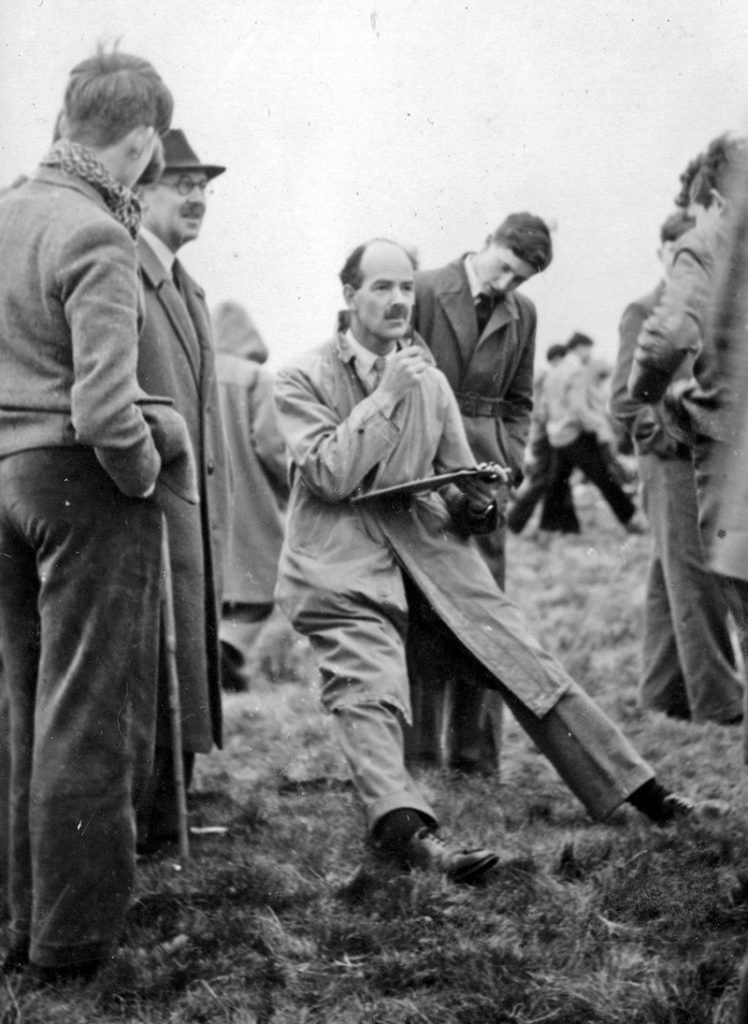
Athletics
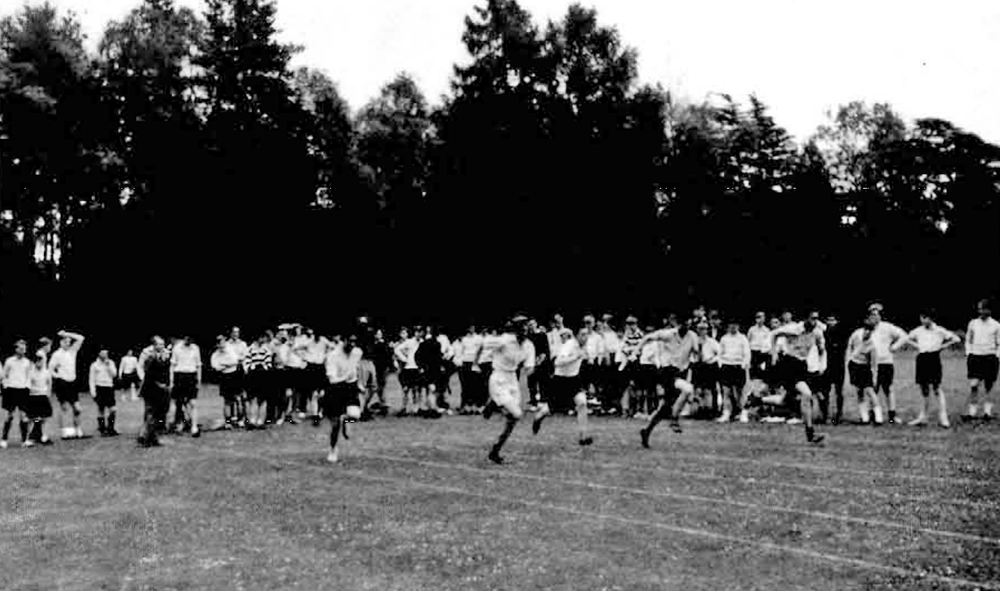
For those not fans of cricket, athletics was the summer alternative. A couple of OWs were quick to note one advantage of this:
‘During the Summer term, especially in hot weather, there was a certain sense of envy by the cricketers of the athletes; the latter had a more finite end time, which gave them time for a swim, and the athletics tracks were next to the pool, whereas the cricket games usually dragged on and most games were played on Derby Field, some way from the pool.’ Richard Craven (Hill 1950-54)
‘I did athletics during the Summer term rather than cricket, because you got off for a bathe earlier!’ Charles Ward (Hopetoun 1951-55)
All boys were encouraged to participate in ‘Standards,’ as explained by some OWs:
‘As Captain of Athletics, I had to keep the records of the whole school for the athletics Standards Competition. All boys were encouraged to go to Rockies and attempt to achieve the “standard performance” (either as a junior or senior) for their age group. This was invigilated by senior boys and the results returned by fag messengers to me in the Benson each day – then to be marked by me on a specially prepared copy of the school roll. The houses with the most “standards” achieved received bonus points to count towards the Toye Challenge Cup, awarded annually to the best all-round performing House on Speech Day.’ Anthony Bruce (Benson 1951-56)
‘“Standards” was a set of minimum achievements, across all disciplines, which each boy had to attain in order to achieve the “Standard.” Qualification was then displayed, per boy by Dormitory/House, in Back Quad. Although there were age brackets, no allowance was made for physical development, hence the taller and longer-legged nearly always had an advantage.’
Richard May-Hill (Hopetoun 1957-61)
Others also commented on this frustration:
‘Until I was about twelve years old, I was not a bad sprinter, but I remained at the height of about five feet from then until leaving College, aged eighteen, at five feet two. This massive disadvantage meant I could only just reach Standards in the 100- and 220-yard (not metres then) sprints. At any greater distance I was useless, taking longer than one minute to complete the 440-yards by some margin. It was a huge disappointment for me.’ Anonymous
‘I don’t remember getting points at any of the events, so one had to go on and on having another go. I once got within one yard of getting the standard for the mile, only of course for that not to count!’ Hugh Trevor (Hopetoun 1943-48)
But some had better memories:
‘I was usually in the second string in the athletics team for the 440 or 880, and came 11th or 13th in the Hayes meeting over three miles – and could have done better had I known the course, as I finished full of running.’ David Nalder (Orange 1949-53)
‘I found out by chance that I was a good runner, and majored in cross-country and athletics. I remember happy days in the summer on Rockies, training under David Newsome’s supervision.’
John Thorneycroft (Benson 1953-58)
‘I ran the half-mile (880 yards) on Rockies, first for the Colts athletics team and then for the First athletics team, eventually becoming Captain of Athletics. Here, David Newsome was a keen supporter and became a familiar figure on Rockies, with his bow tie and shooting stick!’ Anthony Bruce (Benson 1951-56)
Some commented on their illustrious fellow students:
‘Bruce Tulloh was a contemporary of mine and was already showing his prowess on the track.’ Anonymous
‘There were some first-class athletes during these years. I remember Robin Knox running 1 min 58.5 in the 880 yards in around 1958. This was a remarkably good time for a schoolboy on a grass track.’ Michael Mathew (Murray 1956-60)
And others on another celebrity:
‘World mile record-holder Sydney Wooderson once came to run against College for a Blackheath Harriers team. As a spectator before the start, I “accidentally” bumped against him, to be able to say I had touched a world champion.’ Murray Glover (Anglesey 1947-51)
‘I can say I have run against Sydney Wooderson, who was the Bannister of the pre-War years.’
Richard Sarson (Hardinge 1943-48)
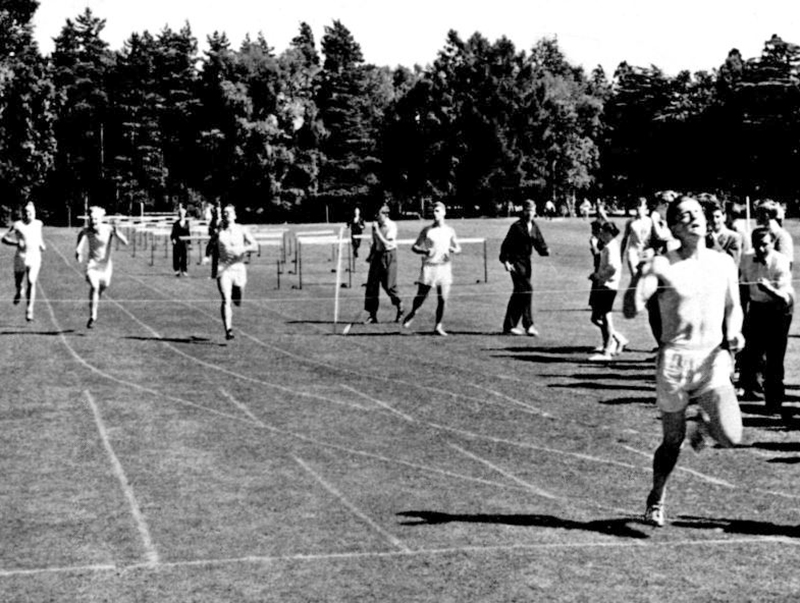
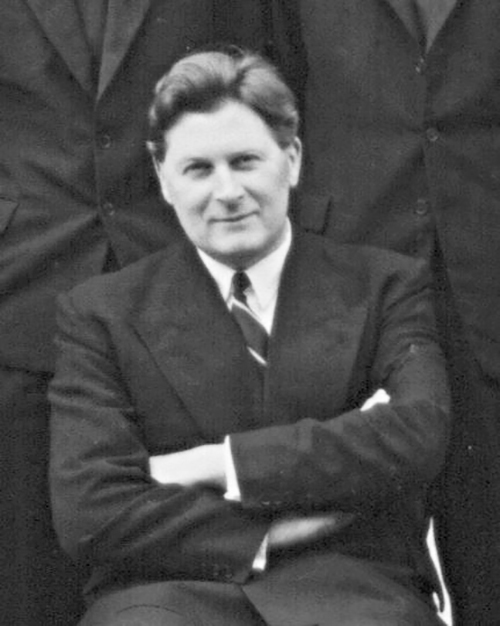
And many recalled the honour of themselves being coached by an international athlete (although not, as some erroneously believed, an Olympian):
‘I chose athletics as my summer sport, representing the school in both discus and high jump. My discus coach was Peter Hincks, who had represented England at shot and discus.’ Murray Glover (Anglesey 1947-51)
‘Being coached by my tutor, Peter Hincks (“Man Mountain”). Although I was only about 10 stone, he taught me the techniques in discus and shot to perform well above my weight!’
Roger Pinhey (Hopetoun 1952-57)
‘I was in the College athletics team for putting the shot and throwing the discus. I became quite obsessed with this sport, and fancied that if I persisted I could possibly participate in a future Olympic Games. My hero was the wonderful American shot putter Parry O’Brien. I was coached by the amiable Peter Hincks, a popular figure, who still in my eyes provides a model for Bulldog Drummond.’ Nikolai Tolstoy-Miloslavsky (Stanley 1949-53)
“Hincks had been a shot-putter at university, and had once gone to the US with a British university team to compete against a joint Yale-Harvard team. He told us that one day when he went out to practice, he discovered, to his horror, the shot impact dents left by the Americans were several feet beyond his personal best. He thought that all was lost. However, he beat the Americans with ease. Later, his American competitors told him that they had just made these dents earlier in the week to psych him out!” Chris Heath (Beresford 1948-53)